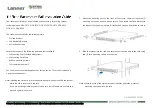
28
Fourth Generation Versatile Interface Processor (VIP4) Installation and Configuration Guide
OL-3673-01
VIP4 Maintenance Procedures
Using the ping Command to Verify Network Connectivity
This section provides brief descriptions of the ping command. The ping command allows you to verify
that an interface port is functioning properly and to check the path between a specific port and connected
devices at various locations on the network. After you verify that the system and VIP4 have booted
successfully and are operational, you can use this command to verify the status of the VIP4 interface
ports. Refer to the publications listed in the
“Related Documentation” section on page 2
for detailed
command descriptions and examples.
The ping command sends an echo request out to a remote device at an IP address that you specify. After
sending a series of signals, the command waits a specified time for the remote device to echo the signals.
Each returned signal is displayed as an exclamation point (!) on the console terminal; each signal that is
not returned before the specified timeout is displayed as a period (.). A series of exclamation points
(!!!!!) indicates a good connection; a series of periods (.....) or the messages [timed out] or [failed]
indicate that the connection failed.
Following is an example of a successful ping command to a remote server with the IP address 10.1.1.60:
Router# ping 10.1.1.60 <Return>
Type escape sequence to abort.
Sending 5, 100-byte ICMP Echoes to 10.1.1.60, timeout is 2 seconds:
!!!!!
Success rate is 100 percent (5/5), round-trip min/avg/max = 1/15/64 ms
Router#
If the connection fails, verify that you have the correct IP address for the server and that the server is
active (powered on), and repeat the ping command.
For complete descriptions of interface subcommands and the configuration options available for
VIP4-related interfaces, and which commands support VIP4 functionality, refer to the publications listed
in the
“Related Documentation” section on page 2
.
VIP4 Maintenance Procedures
The following sections discuss maintenance procedures you might need for your VIP4 and port adapters:
•
Upgrading VIP4 Microcode, page 28
•
Upgrading VIP4 Memory, page 31
•
Checking the VIP4 Memory Upgrade, page 35
•
Installing or Replacing a Port Adapter on a VIP4, page 35
Upgrading VIP4 Microcode
The Cisco 7000 series and Cisco 7500 series routers support downloadable microcode, which enables
you to upgrade microcode versions over the network. You can download new microcode versions and
store multiple versions in Flash memory, and you can then boot from them just as you can with the
system software images. System software upgrades might also contain upgraded microcode images,
which will load automatically when the new software image is loaded (unless the configuration states
otherwise).
















































